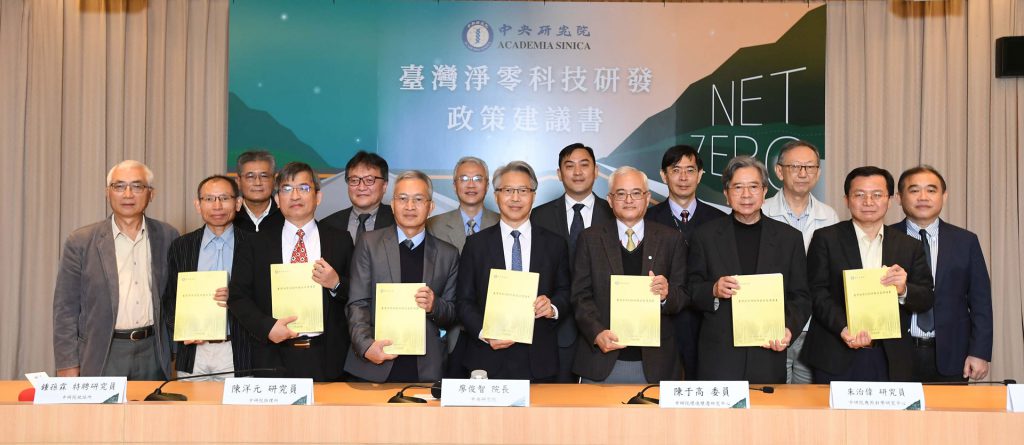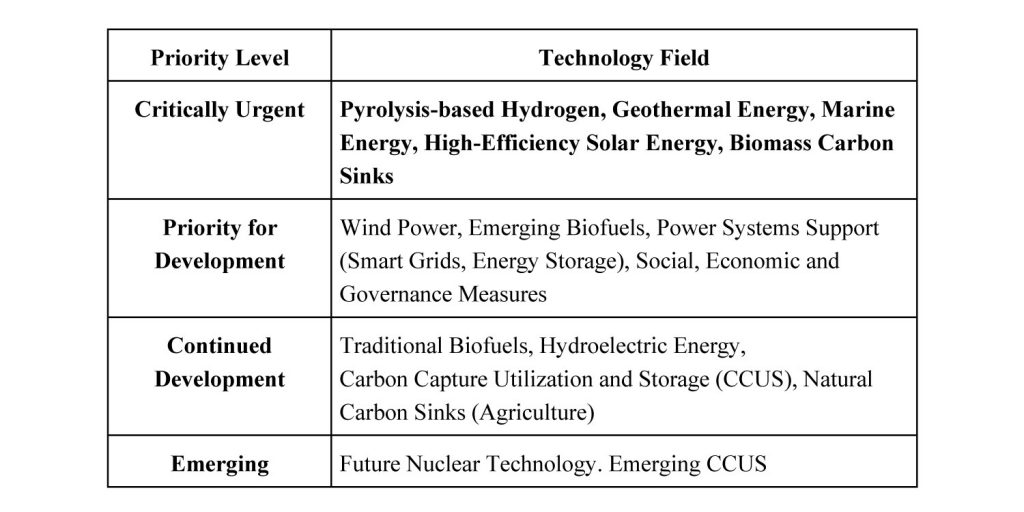Academia Sinica officially announced its Strategic Recommendations for Science and Technology Actions Towards Net Zero Emission in Taiwan on November, 30 2022. Centered on promoting new technologies and incorporating social, economic, and governance measures, the policy recommendations aim to drive energy and industrial transition through technology implementation and facilitate social adaptivity to reach Net Zero by 2050.
The main concern in developing carbon free technology is how effectively it can be established in Taiwan, considering the development pace, scale, and the diversity, locality, and dispersion of energy sources. At present, more than 90% of greenhouse gas emissions in Taiwan come from the power sector, the bulk (>48%) of which comes from electricity production. Aside from efforts to reduce demand, enhance energy efficiency and diversify supply, decarbonizing electricity generation and creating sufficient zero-carbon electricity with new technology should be a top priority. Achieving Net Zero by 2050 requires new, and yet to be developed, technologies, social and economic measures, and endeavors on both the demand and supply sides of energy production and consumption.

Prioritizing Five Critically Urgent Net Zero Technologies
The technology options for decarbonizing electricity generation has been categorized into four priority stages —Critically Urgent (High risk and highly effective technologies yet to be matured and popularized), Priority for Development (Technologies with preliminary actions requiring further promotion efforts), Continued Development (Technologies that should be continued), and Emerging (Technologies in initial phases worth considering for the future). In all states, future efforts should focus on collaboration between different sectors to accelerate technology implementation, initiate social communication and implement governance measures.

(I) Decarbonizing Hydrogen Electricity by Carbon Pre-removal
One project focuses on developing methods for decarbonizing hydrogen electricity, a technique that removes carbon from natural gas before combustion. Compatible with existing natural gas power plants, this technology allows low, or even zero, carbon emission power generation. Compared with traditional methods of carbon dioxide capture, use and storage, this technology offers a new zero-carbon power option. Low-carbon emission natural gas power generation is included as a sustainable energy goal to be achieved by the European Union before 2035. Therefore, technology for decarbonizing natural gas may lead to quasi-green electricity, if it can reduce carbon emissions. Furthermore, this technology produces solid carbon, which is easier to use and store than that produced by the current carbon capture utilization storage technology (CCUS). The recovered carbon and can be used in industrial materials, building materials or as an emergency backup energy source.
(II) Developing Deep Geothermal Systems
Taiwan is located in the Pacific “Ring of Fire” and thus has abundant heat sources for geothermal energy, a stable, sustainable resource for electrical power generation. This project focuses on strengthening and developing subsurface geological mapping and drilling/extraction techniques to provide information essential for building geothermal power plants. In addition to developing better methods to access shallow geothermal reservoirs (less than three kilometers deep), techniques to extract energy from deep geothermal sources have improved significantly in recent years. Geothermal energy could serve as source for a significant amount of electricity, if the relevant background conditions can be improved, such as regulations for geothermal use and feedback power networks.
(III) Developing East Coast Marine Energy
Marine energy, which uses ocean currents and thermal sources, is sustainable energy. Kuroshio, the strongest western boundary current in the Pacific Ocean, flows steadily northward along the east coast of Taiwan. Due to Taiwan’s geographical advantage, sites near the east coast are potentially suitable for harnessing the energy of the Kuroshio Current. The project will first carry out hydrographic and geophysical surveys for potential sites and then invest in developing ocean current energy generation, ocean thermal energy conversion, and marine power grid connection technology. Marine engineering technology will also be developed to construct marine energy power generation facilities.
(IV) Developing High-Efficiency Solar Energy Technology
Taiwan is small and densely populated, without sufficient space for a large number of solar panels. This project aims to improve power conversion efficiency per unit area and actively develop next-generation high-efficiency photovoltaic modules (efficiency ≥30%) using new technology to capture more solar energy. Recently, large-scale production feasibility and performance of perovskite on Si tandem solar panels have been significantly improved. However, production costs and effectiveness still pose a challenge. Strengthening economic and policy incentives to reduce production costs and increase commercial feasibility are therefore important.
(V) Increase Carbon Sinks and Bio-Based Energy
This strategy aims at increasing the agricultural carbon sink and developing bio-based energy. Crop species with high carbon capturing efficiency will be selected and cultivated through molecular breeding and then grown on unused farm lands in Taiwan. The biomass produced will be transformed and stabilized into biochar that can be stored underground as a significant sink of carbon. Bio-based processing technology such as pyrolysis, anaerobic digestion, and hydrolysis–fermentation to convert the biomass to gaseous or liquid fuels, e.g., hydrogen, methane, and bio-ethanol, will also be developed. These efforts will lead to a significant source of renewable energy. Efforts to develop forest management policies to allow thinning and increase wood production to increase domestic biomass production and enhance the forest carbon sink will be promoted.
Additional issues discussed in the Strategic Recommendations for Science and Technology Actions Towards Net Zero Emission in Taiwan include other renewable energy options, carbon reduction options and future groundbreaking technologies. Furthermore, development and implementation of Net Zero solutions require social changes, including policy incentives, economic tools, social communication, legislation and governance strategies.
Since the establishment of the “Consulting Committee for Policy Recommendations on Decarbonizing Energy Sources Leading to Sustainability” in 2020, AS has invited experts and representatives from relevant fields in both academia and industry to discuss challenges and possible solutions based on current developments. Workshops to discuss social, economic and policy issues, as well as conferences with government agencies and think tanks were held. These policy recommendations are expected to spark broad discussions, introduce the public to new technology options and development opportunities, and lead to progress in incorporating economic and social measures for the pursuit of Taiwan’s Net Zero goal.
The press conference today, hosted by the Committee convener President James C. Liao, included a presentation of research results and policy recommendations by Distinguished Research Fellow and Director Yue-Gau Chen from the Research Center for Environmental Changes. Dignitaries and the editing group of the policy recommendations as well as several notable guests concerned about zero carbon issues were also in attendance.
In constructing committees/panels to deliberate key issues regarding science and technology, as well as their impacts on society, Academicians and experts in related fields are selected to provide input. The findings are published as policy recommendations for the government. From an academic perspective, innovative and disruptive ideas are provided to assist government policy making and strategy implementation.
Please click here to read the full version of the Strategic Recommendations for Science and Technology Actions Towards Net Zero Emission in Taiwan.
